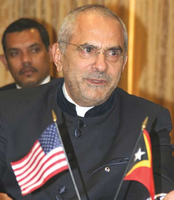On Feb. 11, 2008, gunfire erupted across Dili, the capital of East Timor, as rebels under disgruntled former army officer Alfredo Reinado unleashed separate attacks against the country's president and prime minister. President Jose Ramos-Horta, who a year earlier had won the country's first presidential election since gaining independence in 2002, was shot and wounded. Prime Minister Xanana Gusmao escaped injury. Reinado and another rebel died when government guards fired back on the attackers.
The government of East Timor, also known as Timor Leste, declared a state of emergency after the attack. Two years later, it's clear that the assassination attempts represented the last gasp of East Timor's rebellion and the beginning of a period of relative peace and prosperity for the oil-rich former Portuguese colony. Today, East Timor faces a new and more welcome set of challenges: negotiating potentially conflicting, and sometimes faltering, efforts by world and regional powers to gain influence in the still under-developed country of 1 million.
"It's fundamentally correct that the crises have passed," Jim Della-Giacoma, an analyst with the Brussels-based International Crisis Group, told World Politics Review. "Whether [East Timor] is free of tensions and troubles is another matter." Della-Giacoma mentioned border incursions by neighboring Indonesia - which occupied East Timor for more than two decades beginning in the 1970s -- plus the reported presence of a small group of anti-government thugs known as "ninjas," as potential security flashpoints. "I think there is tension there, unresolved conflict. But I would agree that the country is at peace -- even booming at the moment, with all the oil coming in."

